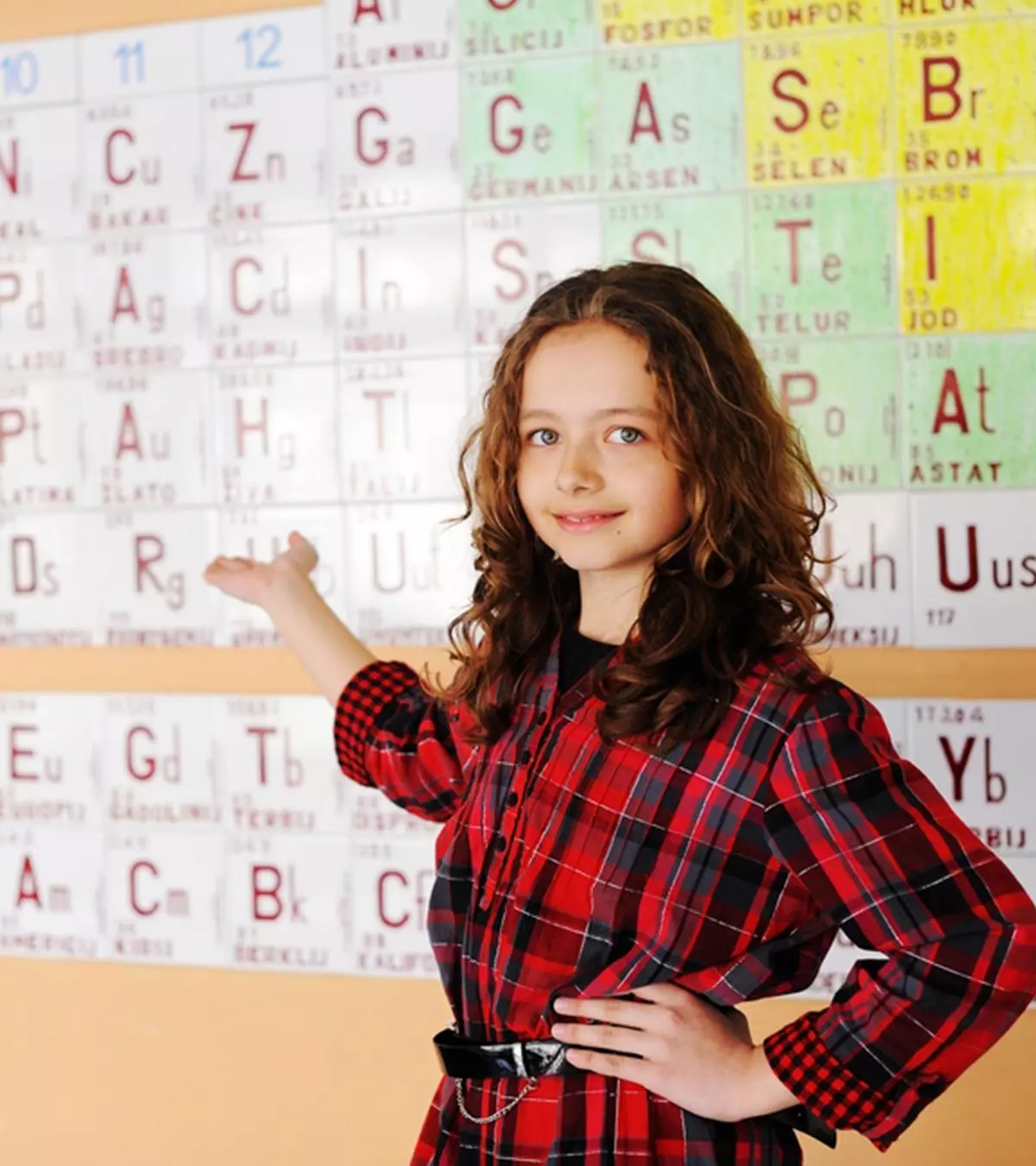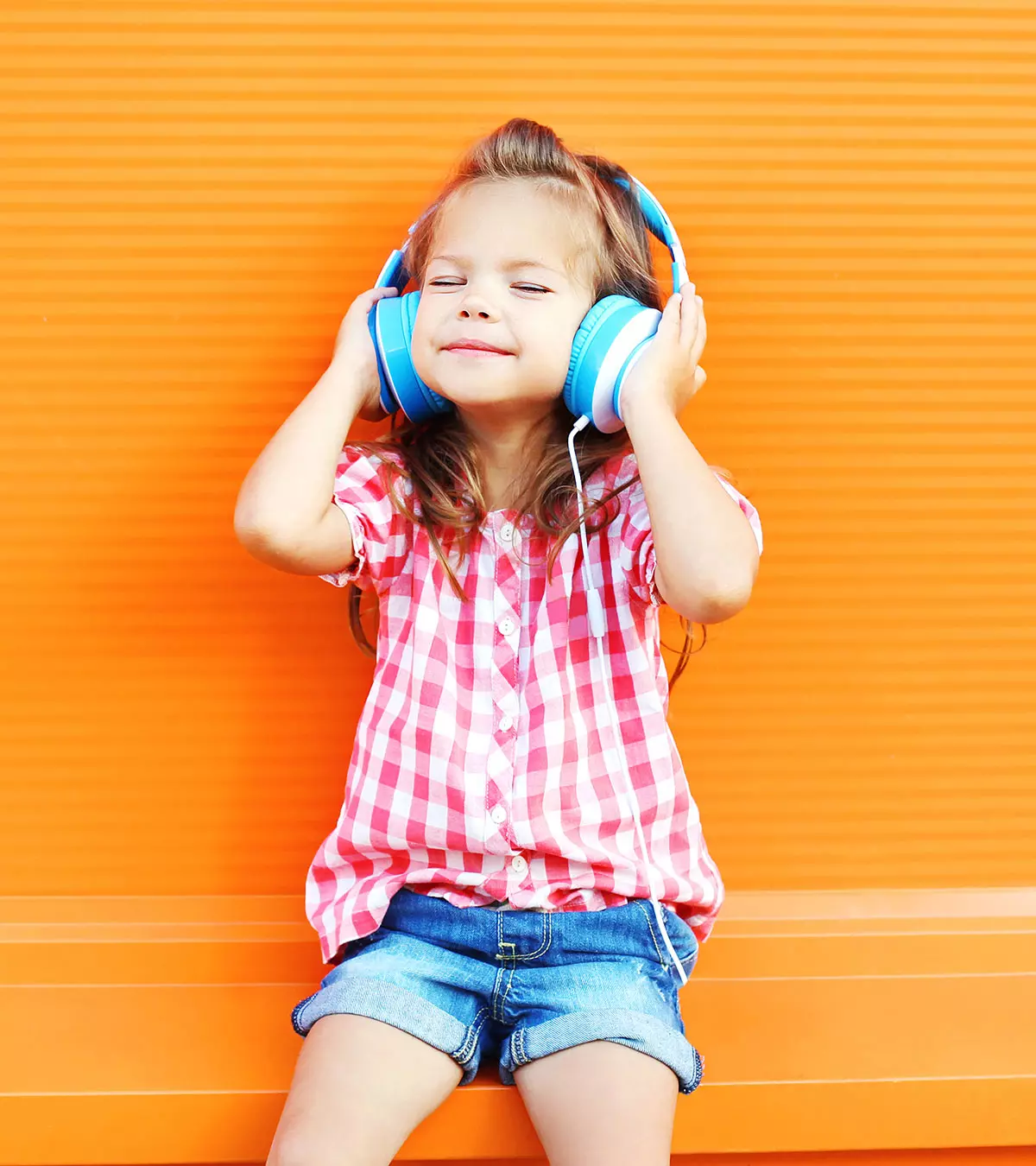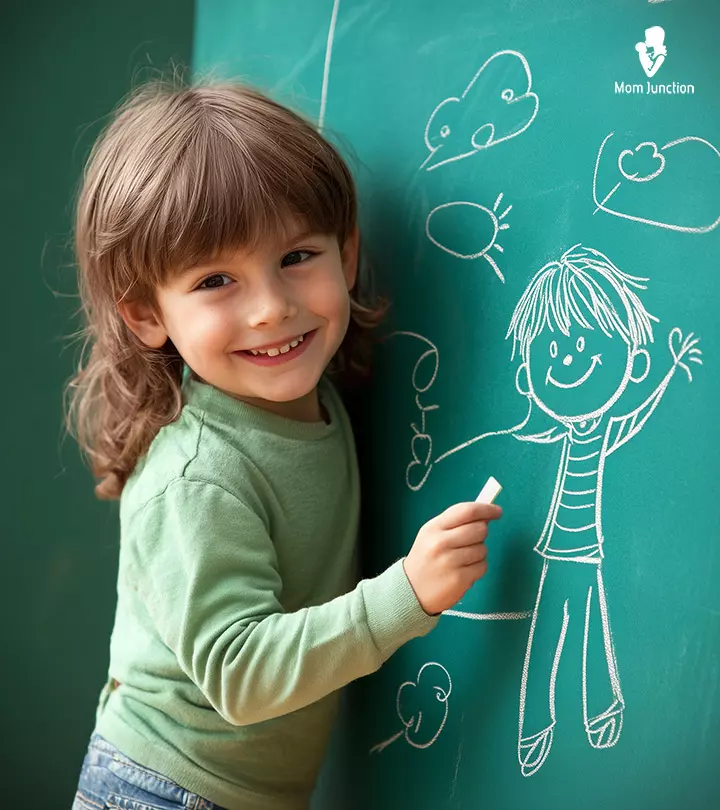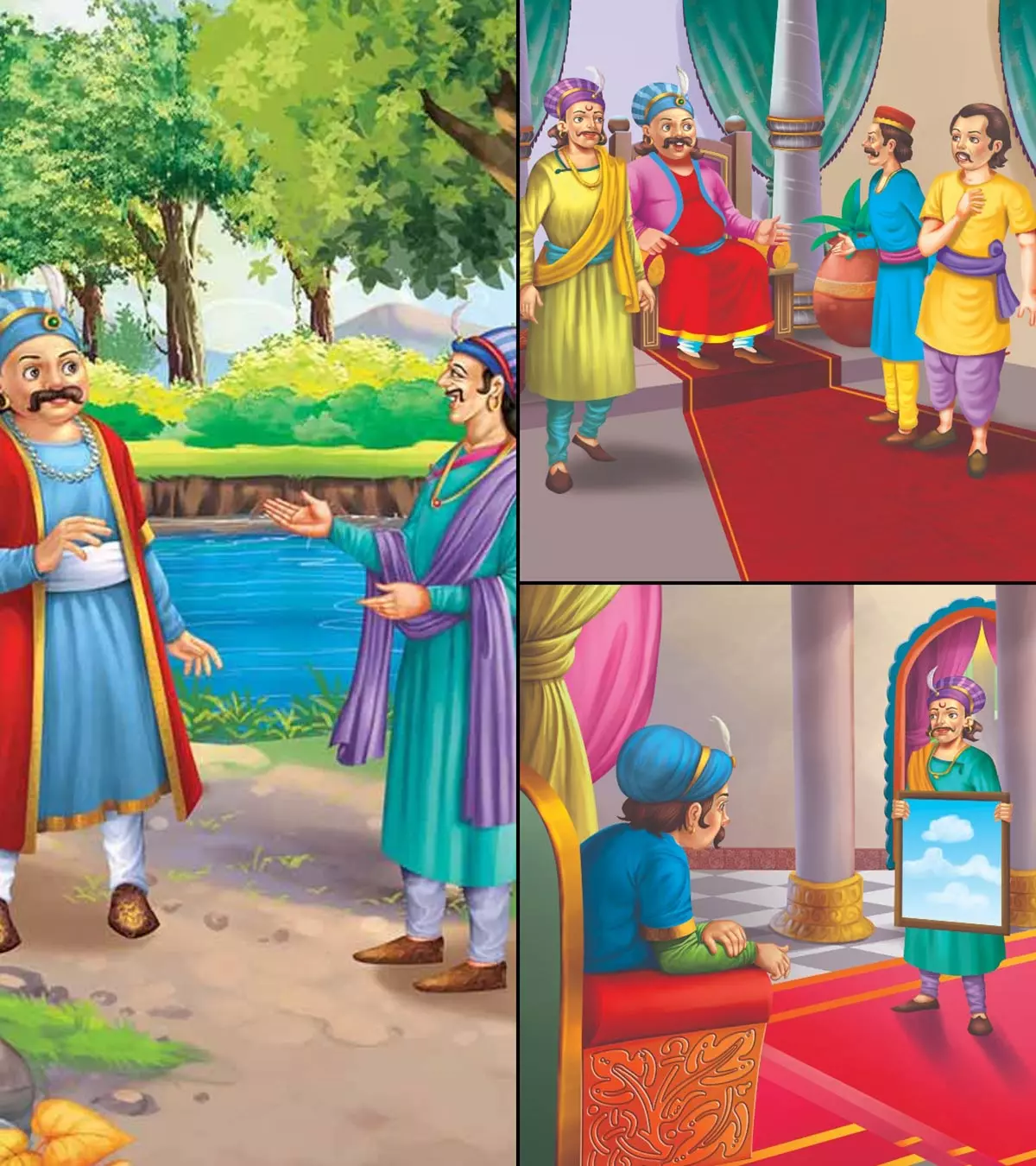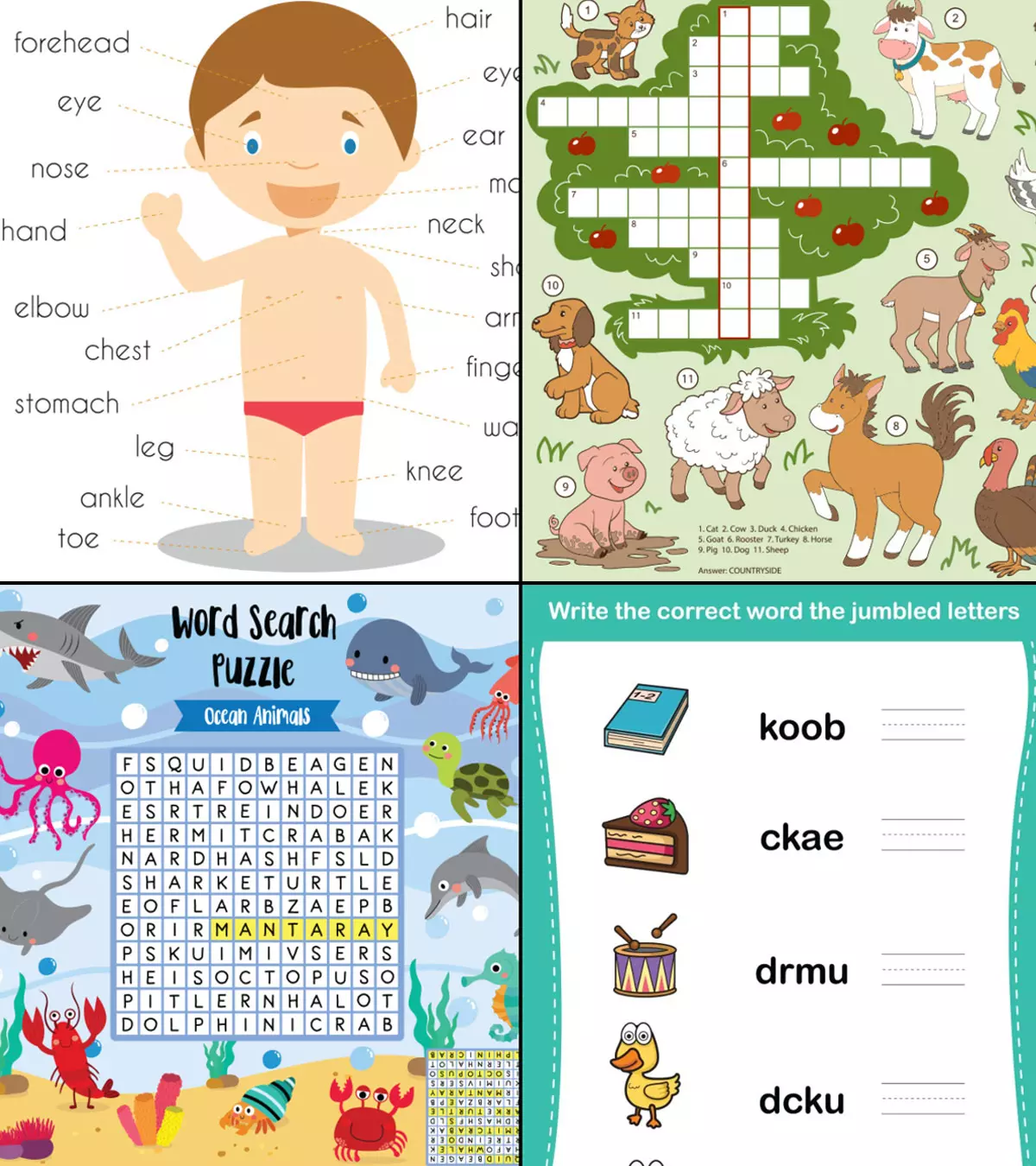
Image: MomJunction Design Team
English is a beautiful language but complicated to learn. However, learning can be fun and informative with some English worksheets for kids. These worksheets can help children learn the language excitingly, making the English education process enjoyable. These worksheets not only make learning fun but also ensure that children are able to acquire essential language skills effectively. By engaging in these exercises, kids develop critical thinking and problem-solving abilities and a solid foundation in English that supports their future educational journey. Here are some exciting worksheets that you can consider starting with your little one so they can learn seamlessly. There are sheets designed for kindergarten kids, focusing on grammar, vocabulary, reading, writing, and parts of speech exercises. Read through the post to pick suitable worksheets for your child.
Key Pointers
- English worksheets for kids offer a fun and interactive way to learn the language, covering various aspects such as grammar, vocabulary, reading, and writing.
- They cover various topics, such as the alphabet, crosswords, rebus puzzles, word search puzzles, missing letters, jumbled letters, body parts, opposite words, and degrees of comparison.
- The worksheets can especially serve non-English-speaking children and help them enjoy learning English.
1. Alphabet
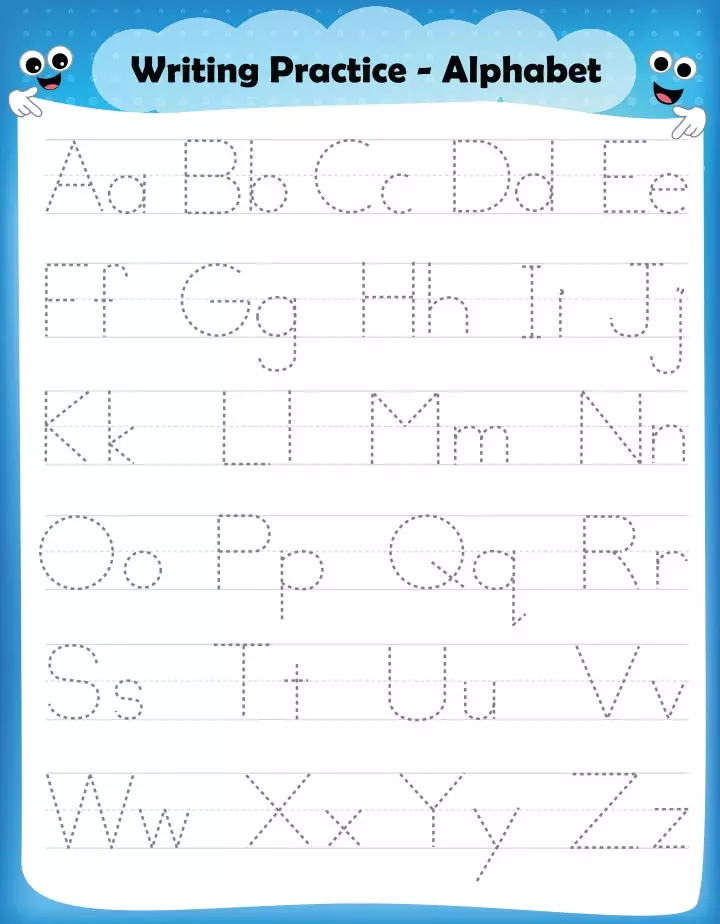
Teach your children every letter in the English alphabet by helping them trace it. The sheet has both the upper and lower case alphabets for your child to trace them together or separately.
2. Crosswords
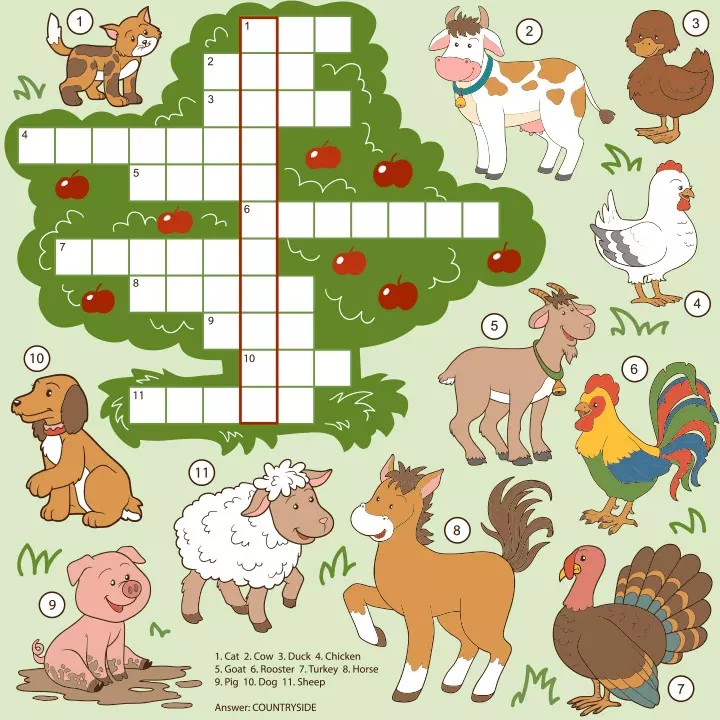
This worksheet is useful when your child begins to learn short words. It has animal figures on it; your kid needs to identify them and write the spellings in the puzzle. Kids can look at the pictures and take hints to recognize the words. This is one of the best kindergarten writing activities.
3. Solve the rebus
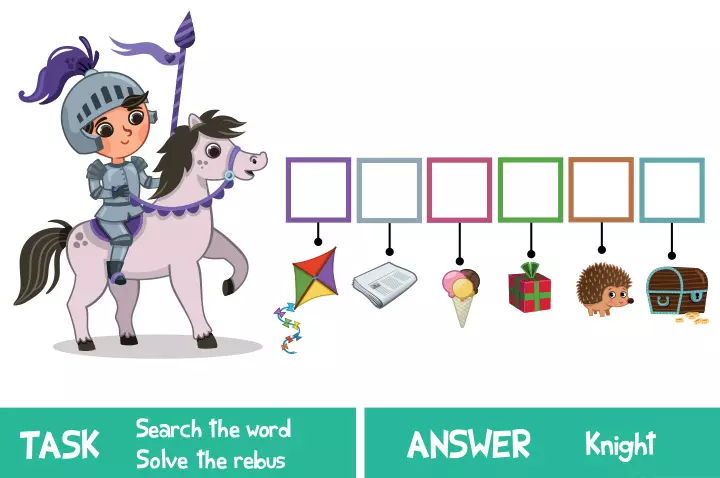
A rebus is one of the most efficient ways of learning words. The worksheet has a combination of pictures and letters that represent some words.
For example, remembering the word ‘Knight’ and its spelling can be quite a challenge for kids. This rebus worksheet represents each letter of the word ‘Knight’ with a picture. The first letter K can be linked with a much easier object like ‘Kite’ for kids to remember. Similarly, “N” for the newspaper, “I” for ice cream, “G” for a gift, “H” for hedgehog, and “T” for treasure.
4. Word search puzzle
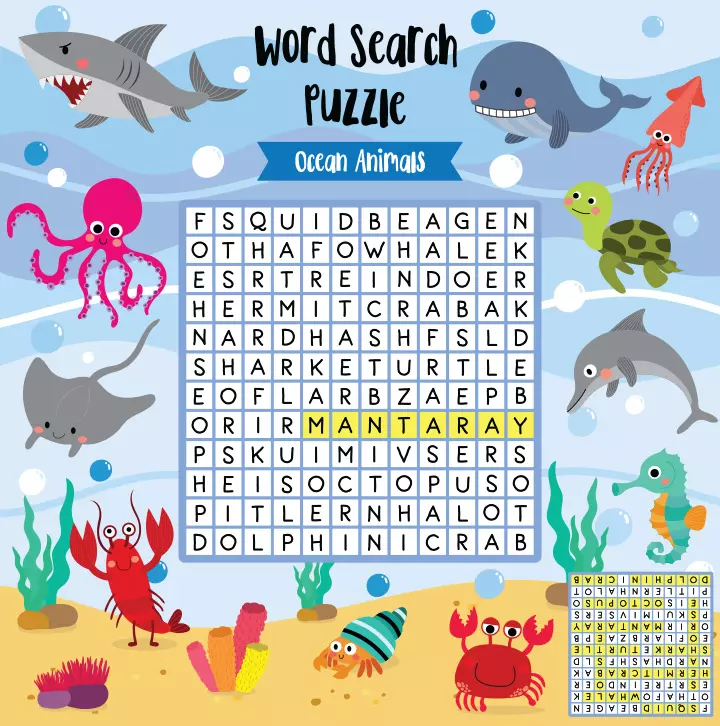
Word search puzzles are very interesting for children as they offer them a scope to learn while playing. The names of the ocean animals are placed in the puzzle. Your child has to look at the picture for reference, identify the animal, its name and start finding the letters that make the word in the puzzle. For example, crab and dolphin can be located in the last row.
5. Find the missing letter
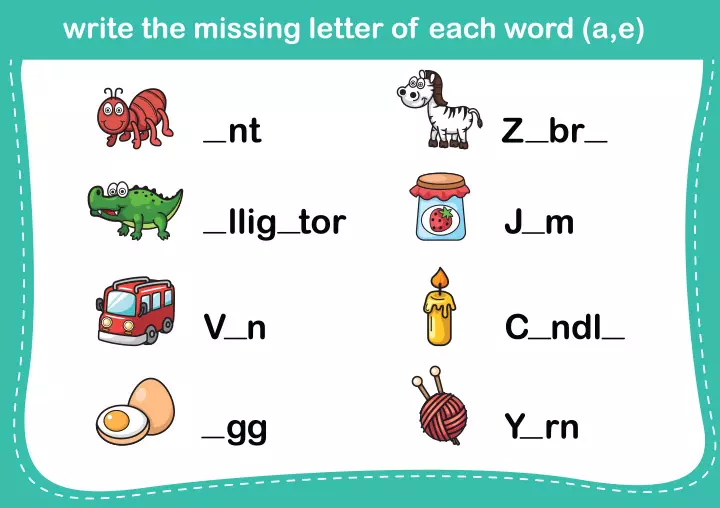
Wondering how to teach kids to spell? Finding the missing letters help children hone their spelling and vocabulary skills. In this worksheet, some letters from each word have been deleted. Ask your kid to fill in the gaps with the right alphabet.
The answers will be ant, alligator, van, egg, zebra, jam, candle, yarn.
6. Correct the jumbled letters
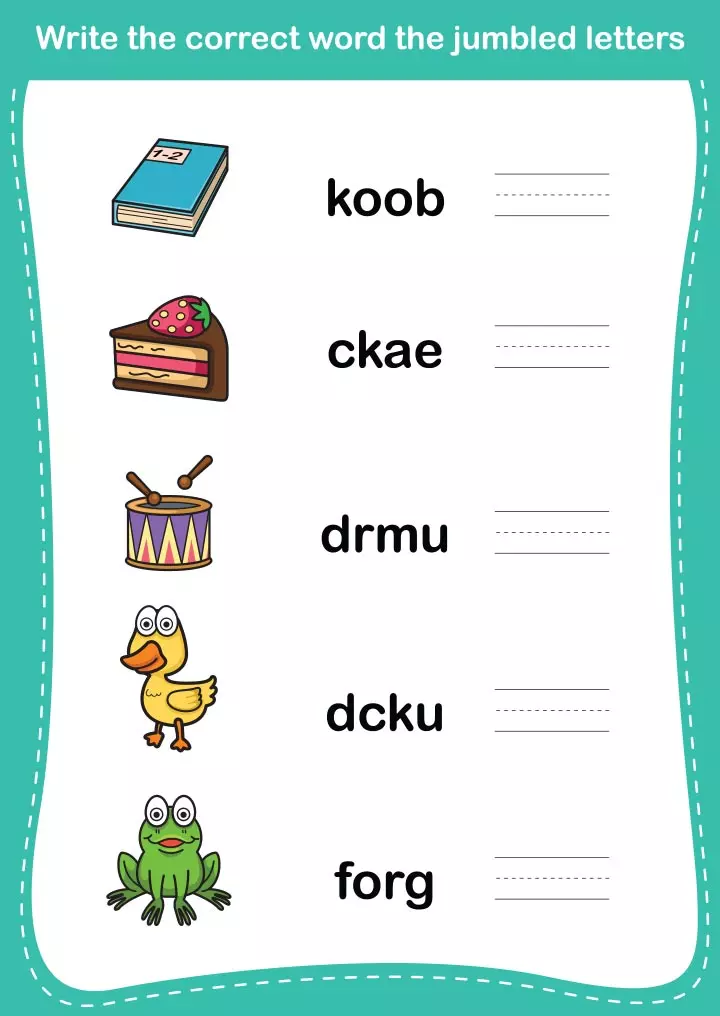
Memorizing words and having them on the tip of the tongue is easier said than done. ‘Correct the jumbled words’ worksheet puts your child’s English vocabulary and critical thinking to test. The sheet provides an image and jumbled letters corresponding to it. Your kid has to come up with the correct sequence of letters to form a word that matches the image. Jumbled words are considered one of the best writing games for kids.
The words will be book, cake, drum, duck, frog.
7. Body parts worksheet
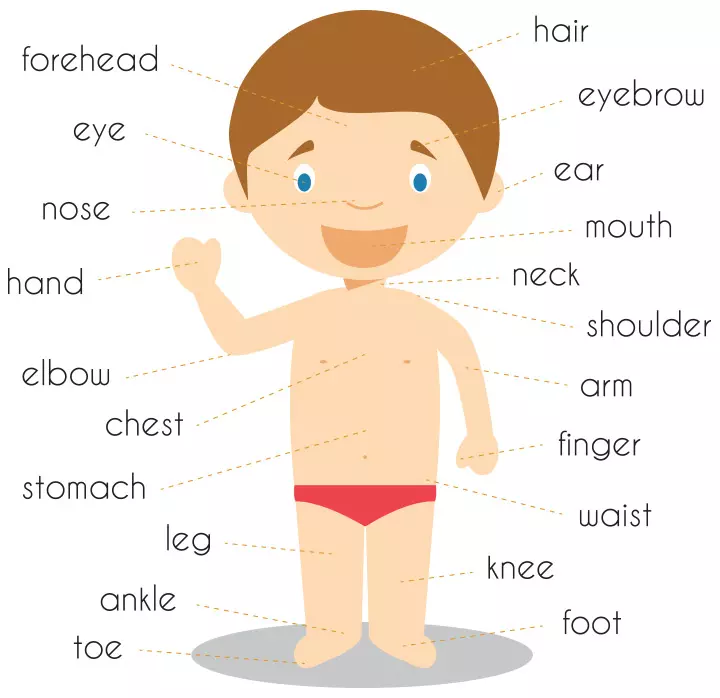
This worksheet displays a little boy’s image and the names of all body parts. The pointers help children to co-relate the body parts with pictures, making it easier to memorize their names and remember their locations.
 Did you know?
Did you know?8. Opposite words worksheet
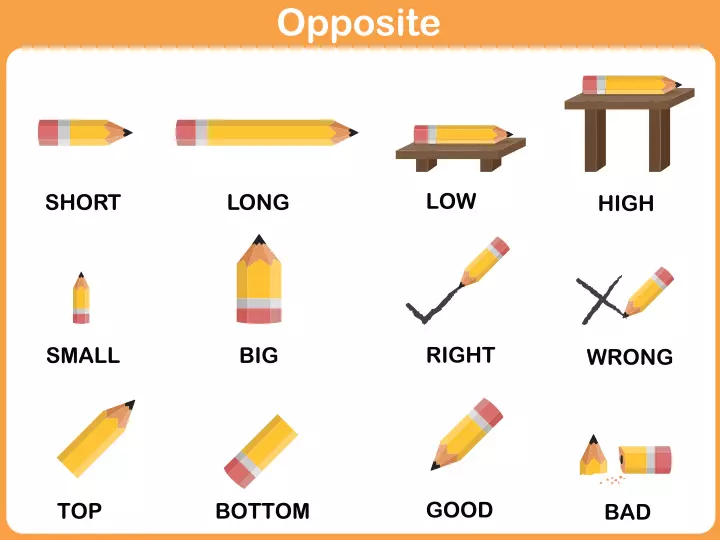
Besides learning words, your little learner needs to know the opposites of several words to develop an excellent vocabulary. These printable English worksheets of different words feature antonyms with images for children to grasp and recollect.
9. Degrees of comparison worksheet
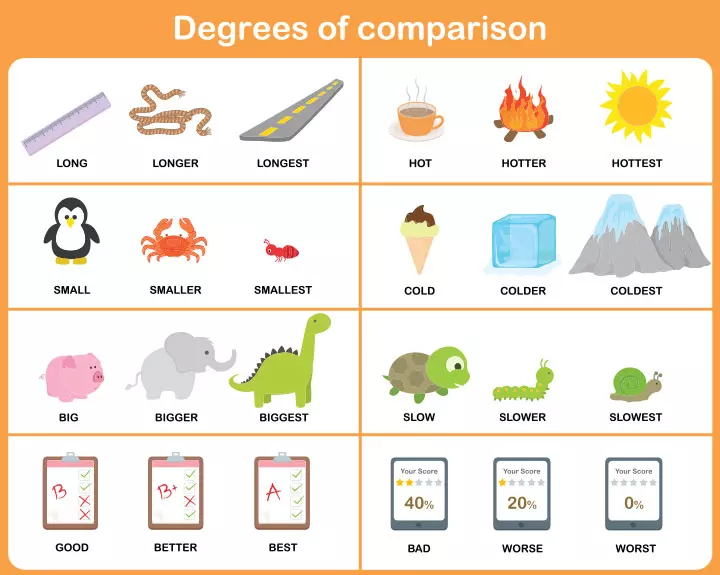
“Degrees of comparison” teaches children the various usages of a single word. The images promote the understanding of positive, comparative and superlative degrees — an integral part of English grammar. Learning the degrees of comparison for various words helps children to understand the difference between two or more objects of identical meaning.
10. Search the word
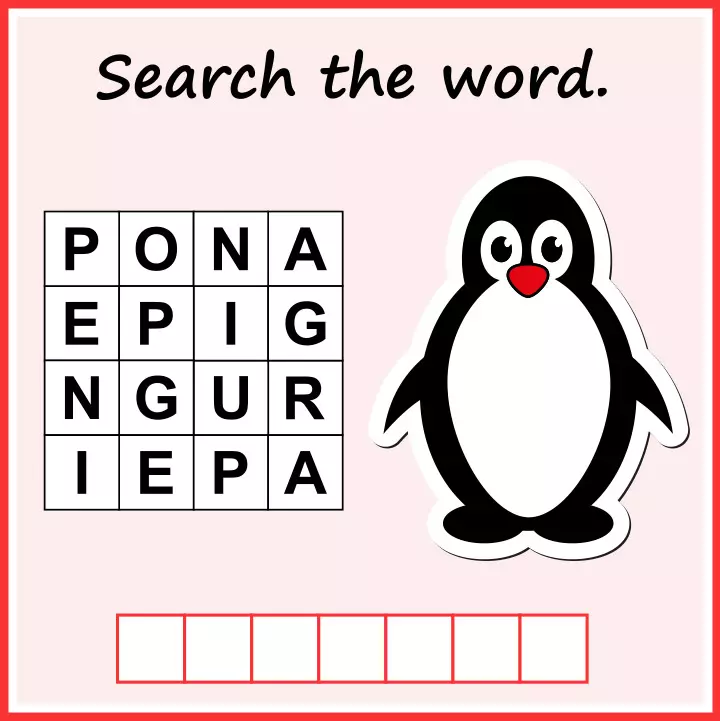
Search-the-word puzzles enable children to memorize words and letters. The image placed beside the puzzle helps kids visualize the animal, recollect the spelling and then trace it in the puzzle.
11. Subject pronouns
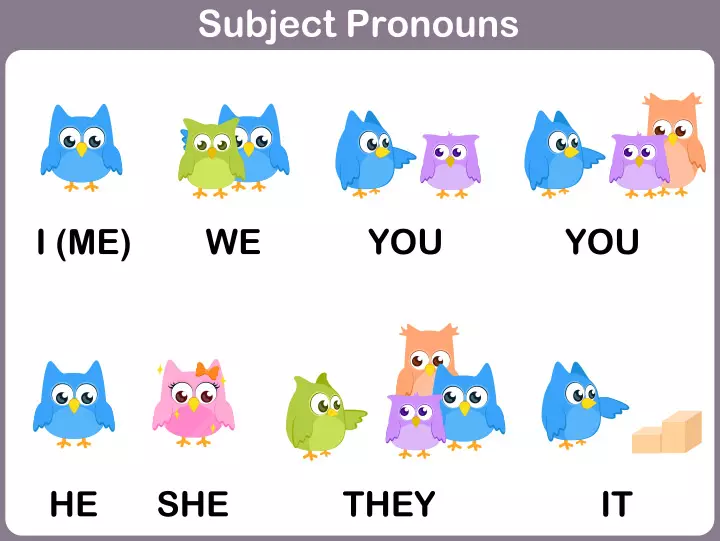
Pronouns can be baffling for kids. Help your little one understand pronouns better by associating them with relevant images and practicing on a grammar worksheet. This worksheet helps children to learn the first person, second person, and third person pronouns in a fun and interactive manner.
12. Preposition
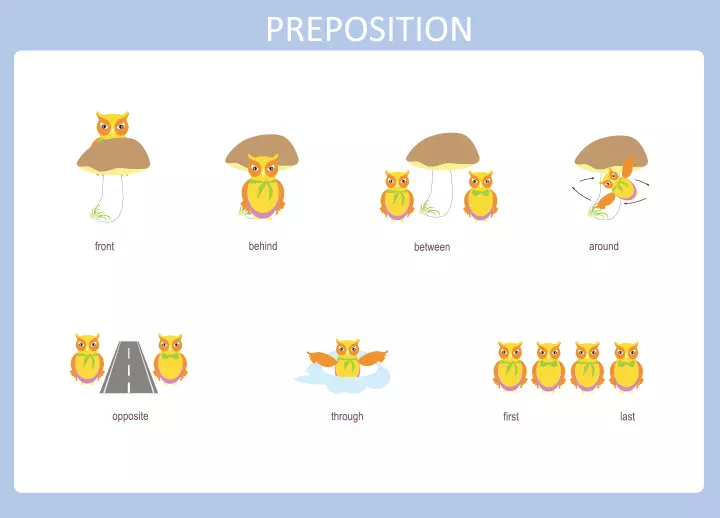
This ESL activity features an owl and a rock in varied situations where different prepositions are used. Children remember best when they can associate a new word or a complex word with an image, and this worksheet is perfect.
 Quick fact
Quick fact13. Action verbs
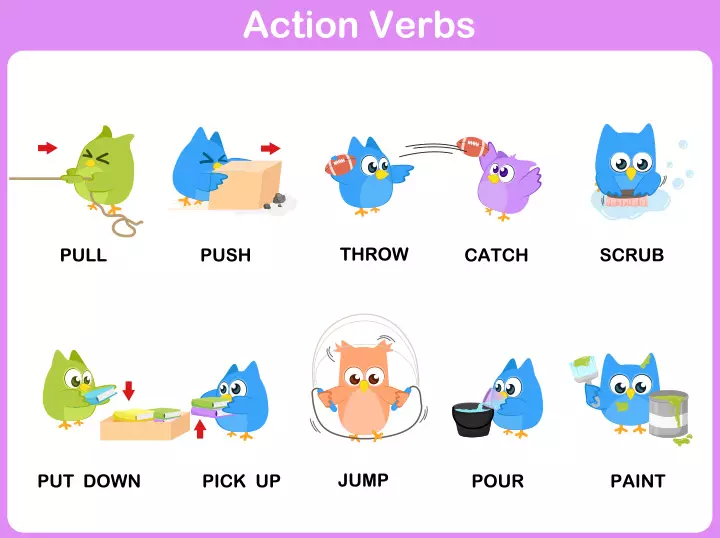
Action words are words that show action. This ESL worksheet features an owl performing several activities or actions, like pulling, throwing, and catching. Besides teaching many common action verbs, they get to learn new words and, thereby, enrich their vocabulary too. Associating these action verbs with images makes it easier for children to understand and remember. This activity is essential for building communication skills in kids.
14. Question words
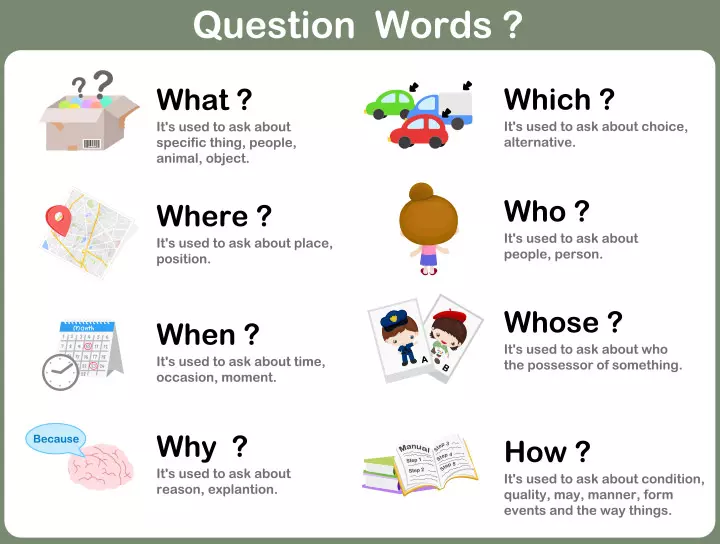
It is time for your kid to ask numerous questions in the English language. Question words worksheet helps your little one learn multiple W questions and also H questions, namely what, why, where, which, whose, who and how – the basics for initiating any question.
15. Consonant blends
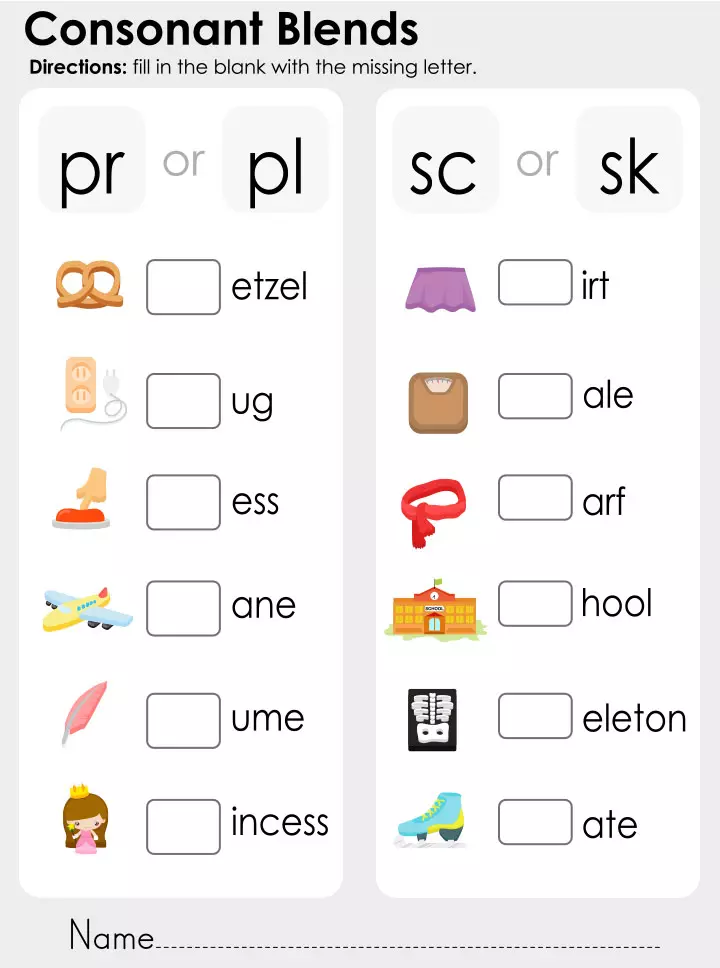
Consonant blends are also known as consonant clusters where a group of two or three consonants forms a distinct sound, such as BL/SK/SL. In this worksheet, PR, PL, SC or SK are consonant blends. They form different words like a pretzel, plug, scale, and skirt. This worksheet has one image associated with one word, and kids are encouraged to use either PL or PR to form the word. By practicing this worksheet, young children will also learn commonly mistaken spellings and confusion caused by similar sounds such as skirt and scarf.
Frequently Asked Questions
1. How can I make English learning fun for my children?
You can make English learning fun for your child in several ways.
• Singing can help your child remember new words and practice pronunciation.
• Play the game ‘What is it?’ to improve your child’s reading skills.
• Try online listening games.
• Play a game where they name different objects in the house.
• Miswrite English words and ask your child to correct them.
• Make a magic word box from where you pull out new English words every day (1).
2. Why is learning English so important?
English is widely used as a global language for communication and business. Knowing English can open up many opportunities and make traveling, studying, and working abroad easier. It is also essential for accessing a vast amount of information, as a large portion of the internet, books, and other resources are in English.
3. How do English worksheets encourage critical thinking and problem-solving skills in children?
Worksheets present exercises that require the child to discuss ideas and make contextual associations. For example, when arranging a jumbled paragraph, children can detect grammatical patterns and add logical suggestions in sequence. This may influence the use of critical thinking and problem-solving skills to exchange grammatically logical arguments.
4. What role do English worksheets play in developing listening and speaking abilities?
Learning school activities for kids, such as English worksheets, are interactive and interesting to help children engage and understand the lessons better. They encourage young learners to discuss answers, ask questions, spell or pronounce, and engage in listening comprehension-based activities, which may aid in developing listening and speaking abilities.
5. Can English worksheets be used as a supplement to classroom teaching?
English worksheets can be used for homework or classroom activities to supplement textual reading materials.
6. What types of English worksheets are available for different age groups?
There are various types of English worksheets available for different age groups, each designed to suit their developmental stages and learning needs. For preschoolers, alphabet tracing worksheets help them learn letter recognition and basic writing skills. Kindergarteners often benefit from vocabulary-building worksheets that introduce new words and simple sentence structures. As children grow older, worksheets focusing on grammar, sentence construction, and comprehension exercises become more appropriate, helping them to refine their language skills.
These English worksheets for kids are a great way to teach the language to non-English-speaking children as it is equally enjoyable for them. Children may learn to trace the English alphabet letters or spell through crosswords. Degrees of comparison, pronouns, action words, and prepositions may be taught through pictures in worksheets. A word search puzzle, filling in missing letters, or using question words are other options to improve English language and comprehension skills. Try these free and printable creative English worksheets to assist you in teaching English to your child.
Illustration: Free English Worksheets For Kids To Practice
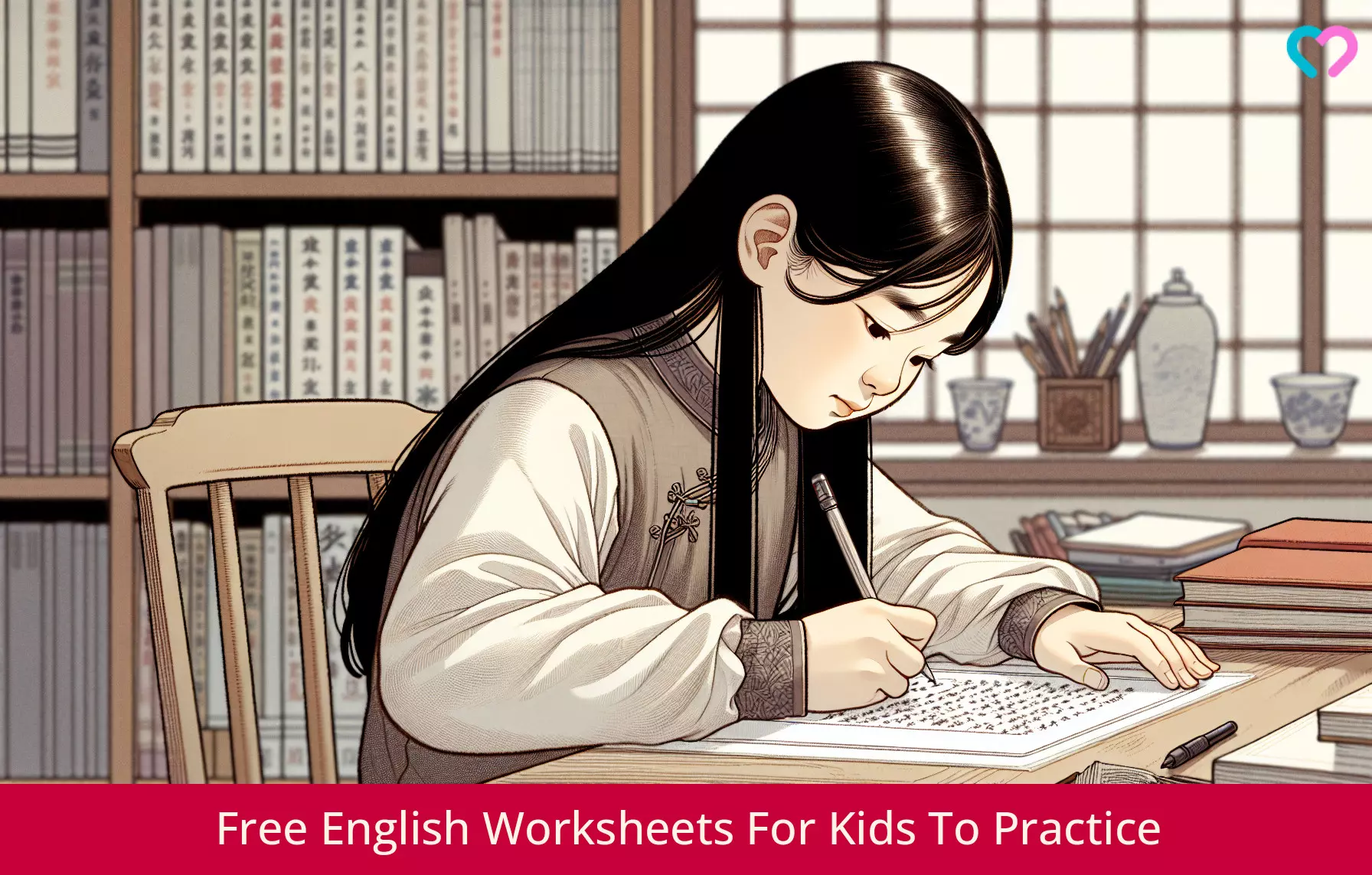
Image: Dall·E/MomJunction Design Team
References
- Harits Masduqi; Critical Thinking Skills And Meaning In English Language Teaching
https://core.ac.uk/download/pdf/233167362.pdf
Community Experiences
Join the conversation and become a part of our nurturing community! Share your stories, experiences, and insights to connect with fellow parents.
Read full bio of Elisabeth Daly
Read full bio of Harshita Makvana
Read full bio of Deepa Thomas
Read full bio of Trisha Chakraborty






